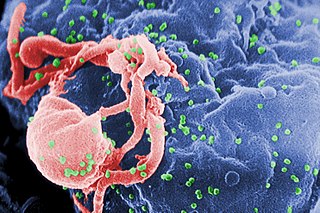Immunostimulants, also known as immunostimulators, are substances that stimulate the immune system usually in a non-specific manner by inducing activation or increasing activity of any of its components. One notable example is the granulocyte macrophage colony-stimulating factor. The goal of this stimulated immune response is usually to help the body have a stronger immune system response in order to improve outcomes in the case of an infection or cancer malignancy. There is also some evidence that immunostimulants may be useful to help decrease severe acute illness related to chronic obstructive pulmonary disease or acute infections in the lungs.

Kiril Tsochev Bratanov was a prominent Bulgarian biologist and pioneer in the area of immunology of reproduction.
Reproductive immunology refers to a field of medicine that studies interactions between the immune system and components related to the reproductive system, such as maternal immune tolerance towards the fetus, or immunological interactions across the blood-testis barrier. The concept has been used by fertility clinics to explain fertility problems, recurrent miscarriages and pregnancy complications observed when this state of immunological tolerance is not successfully achieved. Immunological therapy is a method for treating many cases of previously "unexplained infertility" or recurrent miscarriage.
Zeda Fran Rosenberg is an American microbiologist and epidemiologist, active in HIV biology and prevention. She is the chief executive officer of the International Partnership for Microbicides (IPM). IPM was founded by Rosenberg in 2002 and is a nonprofit organization dedicated to developing microbicides and other innovative HIV prevention products and making them available for women in developing countries.

CONRAD is a non-profit scientific research organization that works to improve global and reproductive health, particularly in women in developing countries. CONRAD was established in 1986 under a cooperative agreement between Eastern Virginia Medical School (EVMS) and the United States Agency for International Development (USAID). CONRAD’s products are developed primarily for women in low-resource settings, in that they are designed to be safe, affordable and user-friendly. CONRAD is led by Scientific and Executive Director Gustavo F. Doncel, M.D., Ph.D. Primary funding for CONRAD comes from the U.S. President's Emergency Plan for AIDS Relief (PEPFAR) through the U.S. Agency for International Development (USAID), with additional funding from The Bill & Melinda Gates Foundation and the National Institutes of Health (NIH).

HIV/AIDS research includes all medical research that attempts to prevent, treat, or cure HIV/AIDS, as well as fundamental research about the nature of HIV as an infectious agent and AIDS as the disease caused by HIV.
HIV in pregnancy is the presence of an HIV/AIDS infection in a woman while she is pregnant. There is a risk of HIV transmission from mother to child in three primary situations: pregnancy, childbirth, and while breastfeeding. This topic is important because the risk of viral transmission can be significantly reduced with appropriate medical intervention, and without treatment HIV/AIDS can cause significant illness and death in both the mother and child. This is exemplified by data from The Centers for Disease Control (CDC): In the United States and Puerto Rico between the years of 2014–2017, where prenatal care is generally accessible, there were 10,257 infants in the United States and Puerto Rico who were exposed to a maternal HIV infection in utero who did not become infected and 244 exposed infants who did become infected.

The uterine microbiome refers to the community of commensal, nonpathogenic microorganisms—including bacteria, viruses, and yeasts/fungi—present in a healthy uterus, as well as in the amniotic fluid and endometrium. These microorganisms coexist in a specific environment within the uterus, playing a vital role in maintaining reproductive health. In the past, the uterus was believed to be a sterile environment, free of any microbial life. Recent advancements in microbiological research, particularly the improvement of 16S rRNA gene sequencing techniques, have challenged this long-held belief. These advanced techniques have made it possible to detect bacteria and other microorganisms present in very low numbers. Using this procedure that allows the detection of bacteria that cannot be cultured outside the body, studies of microbiota present in the uterus are expected to increase.
Martin Sheldon is a veterinarian and scientific researcher. He is Professor Emeritus at Swansea University Medical School.
Satish Kumar Gupta is an Indian immunologist and an Emeritus Scientist at the National Institute of Immunology. Known for his research in reproductive immunology, Gupta is an elected fellow of all the three Indian science academies viz. Indian Academy of Sciences, National Academy of Sciences, India and Indian National Science Academy He is also a J. C. Bose Fellow of the Department of Biotechnology and an elected fellow of the National Academy of Medical Sciences. The Council of Scientific and Industrial Research, the apex agency of the Government of India for scientific research, awarded him the Shanti Swarup Bhatnagar Prize for Science and Technology, one of the highest Indian science awards for his contributions to Medical Sciences in 1997.

The vaginal epithelium is the inner lining of the vagina consisting of multiple layers of (squamous) cells. The basal membrane provides the support for the first layer of the epithelium-the basal layer. The intermediate layers lie upon the basal layer, and the superficial layer is the outermost layer of the epithelium. Anatomists have described the epithelium as consisting of as many as 40 distinct layers of cells. The mucus found on the epithelium is secreted by the cervix and uterus. The rugae of the epithelium create an involuted surface and result in a large surface area that covers 360 cm2. This large surface area allows the trans-epithelial absorption of some medications via the vaginal route.
Multipurpose prevention technologies (MPTs) are a class of products designed to address at least two health issues simultaneously, often focusing on sexual and reproductive health which includes contraception, human immunodeficiency virus (HIV) prevention, other sexually transmitted infection (STI) preventions, such as genital infection by human simplex virus (HSV) infection and human papillomavirus (HPV) infection. For example, MPTs can combine contraception and HIV prevention, contraception and other STI prevention, or the prevention of multiple STIs. Since the simultaneous use of multiple products with a single indication against each specific sexual and reproductive health issue is inconvenient, this method may affect adherence. As a result, the goal of developing a MPT as an all-in-one product is to combat this issue.
Barbara Anne Croy is a Canadian reproductive immunologist and professor emerita in Biomedical and Molecular Sciences at Queen's University. From 2004 until 2016, Croy was a Canada Research Chair in Reproduction, Development and Sexual Function. In 2017, she was elected a Fellow of the Royal Society of Canada. Her research focus is on mice pregnancy and natural killer cells.

Stephen James Challacombe FRC(Path), FDSRCS, FMedSci, is professor of oral medicine at King's College in London, best known for research in oromucosal immunology and for developing the Challacombe scale for measuring the extent of dryness of the mouth. He led the team that laid out research challenges of global health inequalities and oral health, particularly relating to the oral manifestations of HIV.
Sarah Anne Robertson is an Australian biologist who is a fellow of both the Australian Academy of Science and Australian Academy for Health and Medical Sciences, and Professor of Reproductive Immunology at University of Adelaide, Australia, and Director of the Robinson Research Institute. She was an NHMRC fellow for more than 15 years.

Niki M. Moutsopoulos is a Greek periodontist and immunologist. She is a senior investigator in the oral immunity and infection section at the National Institute of Dental and Craniofacial Research. Moutsopoulos specializes in oral immunology and periodontitis. Her research program focuses on host-microbial interactions that can drive chronic inflammatory responses and tissue destruction in the oral cavity.
Sharon Louise Hillier is an American microbiologist. She is the Richard Sweet Endowed Chair in Reproductive Infectious Disease and vice chair of the department of obstetrics, gynecology and reproductive sciences at the University of Pittsburgh Medical Center (UPMC) and Magee-Women's Research Institute.

Kendall A. Smith is an American medical scientist best known for his work on interleukins, the regulatory molecules of the immune system, which has led to many of the new present-day therapies for immunological disorders, transplant rejection, infectious diseases and cancer. Smith is a Professor Emeritus of Medicine at Weill Cornell Medicine.
Lisa Cencia Rohan is an American chemist and pharmaceutical scientist.







